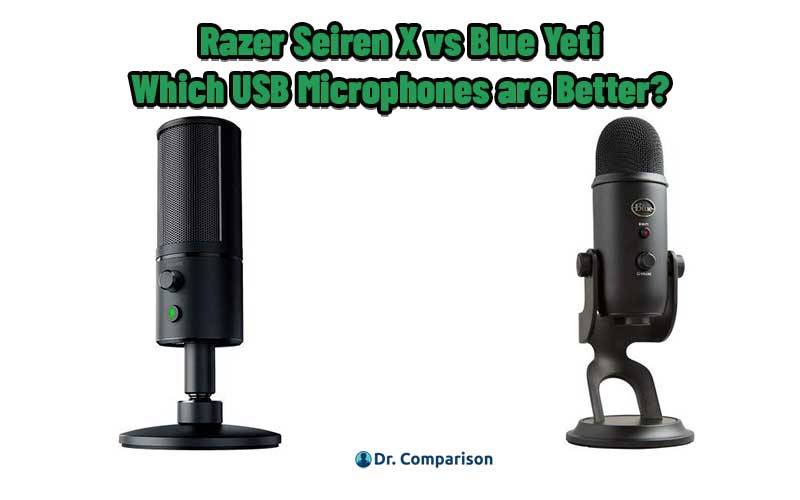Table of Contents
For anybody requiring a way to record their voice, be it for communication or creative projects, a microphone is a must. However, getting a full audio recording setup is a huge investment especially if you do not need to use these devices professionally. The solution for such cases comes in the form of USB microphones. They are generally cheap and use the most widely present port. Razer Seiren X and Blue Yeti are very popular choices on the market, so we will give them a proper overview as well as pick which of the two is a better pick for your needs.
Razer Seiren X vs Blue Yeti – Similarities
Quick Glance
| Name | Razer Seiren X | Blue Yeti |
| Image | 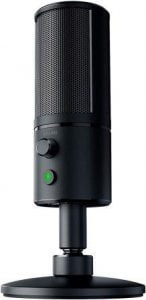 | 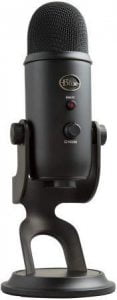 |
| Weight | 12.8 ounces | 45.12 ounces |
| Dimensions | 4.1 x 7.72 x 8.43 inches | 4.92 x 4.72 x 11.61 inches |
| Color | Black, quartz, mercury | Blue, silver, black |
| Max SPL | 110 dB | 120 dB |
| Frequency Response Range | 20 Hz – 20 kHz | 20 Hz – 20 kHz |
| Connectivity | USB | USB |
| Polar patterns | Super-cardioid | Cardioid, omnidirectional, bidirectional, stereo |
| Bit rate | 16 bit | 16 bit |
| Sample rate | 48 kHz | 48 kHz |
| Impedance | 16 ohms | 16 ohms |
| Price |
Minimal and maximum frequency response
In terms of audio quality, in this case, referring to the volume being reproduced, frequency response is one of the more prominent measuring sticks. The lower the minimal frequency response the better the device reproduces bass and other low sounds. On the other end, the high end determines the quality of treble inherent in sound being recorded as well as covering more high-pitched notes. As far as actual specifications of our two models go the low end on them is 20 Hz while the high end reaches 20 kHz. These are pretty standard specifications for audio devices in their price range.
Differences Between Razer Seiren X vs Blue Yeti
Max Sound Pressure Level
The volume of sound reproduced by microphones is one of the most standard ways of determining their quality. The category of max sound pressure level gives us a better insight into the way sound will be formed after being received by the microphone.
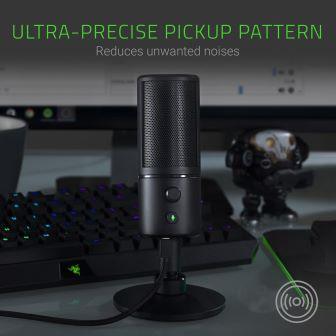
Razer Seiren X
In terms of SPL we can see Razer Seiren X reach 110 dB obtaining a very decent volume.
Blue Yeti
The max SPL of Blue Yeti is 120 db. Very good in terms of microphone market, especially for its price.
The Winner: Blue Yeti
Read next – Audio Technica AT2035 vs Blue Yeti: Which Microphones are Better?
Sample Rate
Put simply, the sample rate is the frequency of taking samples from the sound being recorded. The more frequent the sample rate the clearer the sound as the signal gets updated more often.
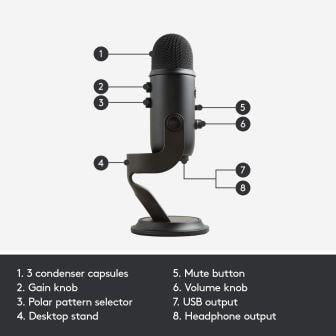
Razer Seiren X
Razer is one of the most prevalent gaming device manufacturers so it is no surprise their microphone is also decently powerful. Razer Seiren X sample rate reinforces power found in the previous categories here as well with its 192 kHz sample rate.
Blue Yeti
A more budget-oriented manufacturer like Blue Yeti still puts ample care into their products. As we’ve seen the frequency response range, as well as sound pressure level, are both maintained at an industry standard. However, in terms of sample rate it lags behind Razer Seiren X. Its 48 kHz are still decent but far from what’s already on offer.
The Winner: Razer Seiren X
Recording Patterns
A recording pattern of the microphone decides what area the sound is recorded from. These can vary from single-direction-focused patterns to ones that record sound in a radius around the microphone.
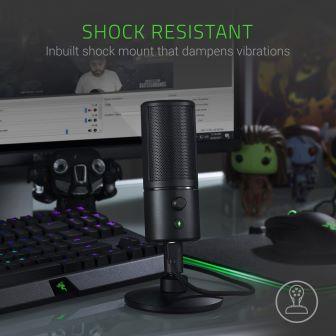
Razer Seiren X
The selection of patterns on this item isn’t that expansive. It has a single option in terms of patterns which is super-cardioid. However, this is a very potent pattern as it focuses on the front side of the microphone. The super in super-cardioid refers to its angle being a lot narrower than it is on regular cardioid. It is great for any style of front-facing recording.
Blue Yeti
On the other hand. Blue Yeti offers a ton of patterns to choose from. It can switch between cardioid, omnidirectional, bidirectional, and stereo. The cardioid one covers a certain area at an angle in front of the microphone. As for omnidirectional, it covers the area around the microphone in a radius while bidirectional listens to the front and the back of the microphone. The stereo is the last one, using overlapping circle patterns around the microphone to record sound. All of these patterns allow for maximum variety when picking recording options and cover a variety of uses. Although for plain, front-facing recording you’ve only cardioid to go for.
Blue Yeti offers a diversity of patterns while Razer Seiren X offers powerful front-facing recording patterns. Both can be a good choice depending on your needs but Razer Seiren X takes this category due to front-facing patterns being the most utilized type for regular tasks and gaming.
The Winner: Razer Seiren x
Read next – Seiren X vs Razer Seiren Pro: Which USB Microphones are Better?
Appearance
The category envelops any important physical design aspects as well as regular aesthetical parts of the devices.
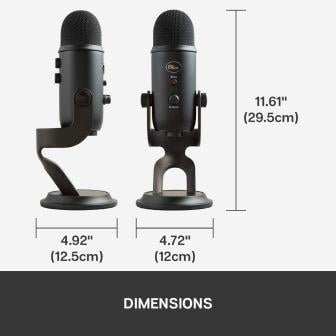
Razer Seiren X
This microphone comes in black, quartz, and mercury for added visual flair. Considering its power Seiren X is rather compact with its compact form factor. The microphone is also shock resistant, assuring a longer lifespan as malfunctions due to bumping into it on accident.
Blue Yeti
Blue Yeti has a very standard style, somewhat resembling old radio microphones. The device itself has a few knobs and other forms of settings to fiddle with if you need quick configurations. Some of the color options here are blue, silver, and black. Less on the colorful side compared to its competitor but a choice of styles. The shock absorption is also built into this robust microphone. On top of all these Blue Yeti is capable of being mounted in a few different positions. This is exceptionally useful for anybody using
The Winner: Blue Yeti
Pros and Cons
Razer Seiren X
PROS
- Great front-facing recording
- Choice of colors
- Great sample rate
- Good SPL
- Choice of style
CONS
- Low choice of patterns
Blue Yeti
PROS
- A lot of pattern choices
- Good SPL
- Variety of mounting options
- Choice of style
CONS
- The sample rate is just okay
The Final Verdict
On the whole, both models provide an ample amount of utility. Be it in terms of their mounting options or their recording pattern. They also share good sound quality across the board with the added benefit of quick access to configurations due to the knobs and buttons on the device itself. However, in the grand scheme of things Razer Seiren showcases some specifications that are more impressive than Blue Yeti. Therefore it gets our suggestion as a better USB microphone.
